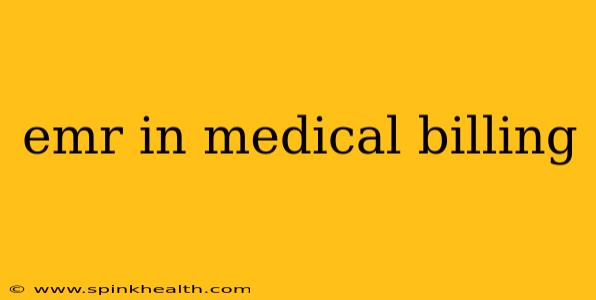The world of medical billing has undergone a dramatic transformation, moving from paper-based systems to the digital age of Electronic Medical Records (EMRs). This shift has profoundly impacted how medical practices manage patient data, generate claims, and ultimately, get paid. But what exactly is the role of EMRs in medical billing, and how has it revolutionized the process? Let's delve into the story.
Imagine Dr. Anya Sharma, a hardworking physician running a bustling family practice. Just a few years ago, her office was a whirlwind of paper charts, overflowing filing cabinets, and endless manual data entry. Billing was a laborious, error-prone process, often leading to delayed payments and frustrating follow-ups. Then came the EMR.
How EMRs Impact Medical Billing
The implementation of an EMR system was initially a significant investment for Dr. Sharma, but the long-term benefits quickly became apparent. The transition wasn't without its challenges—training staff, adapting workflows, and troubleshooting technical issues. However, the advantages far outweighed the initial hurdles.
Here’s how EMRs have streamlined Dr. Sharma's billing process:
- Automated Data Entry: Gone are the days of manually transcribing patient information. EMRs automatically capture key details like diagnoses, procedures, and CPT codes, minimizing errors and saving valuable time.
- Real-Time Claim Submission: With the click of a button, Dr. Sharma can now submit clean claims electronically to insurance providers. This drastically reduces the processing time compared to the old paper-based system.
- Improved Accuracy: The automated nature of EMRs significantly reduces the risk of human error in coding and billing, leading to fewer claim denials and faster reimbursements.
- Enhanced Patient Communication: EMRs allow for better communication with patients, streamlining appointment scheduling, prescription refills, and follow-up care. This contributes indirectly to better billing outcomes as well.
- Better Reporting and Analytics: EMRs provide valuable insights into billing trends, allowing Dr. Sharma to identify areas for improvement and optimize her revenue cycle management.
What are the Benefits of Using EMRs in Medical Billing?
The impact of EMRs on Dr. Sharma's practice has been transformative. Her staff is happier, more efficient, and less burdened by administrative tasks. Her revenue cycle is smoother, with fewer denials and faster payments. She has more time to focus on what truly matters: providing excellent patient care.
The benefits extend beyond individual practices. On a larger scale, EMRs contribute to:
- Reduced Healthcare Costs: By streamlining the billing process, EMRs help to reduce administrative overhead, ultimately lowering the cost of healthcare.
- Improved Patient Safety: Accurate and readily accessible patient data contributes to safer and more effective patient care.
- Increased Efficiency: Automation reduces manual tasks, freeing up staff to focus on more critical aspects of patient care.
What are the Challenges of Using EMRs in Medical Billing?
While the advantages are numerous, integrating EMRs into medical billing isn’t without its challenges.
High Initial Cost and Ongoing Maintenance: Implementing an EMR system requires a significant upfront investment, along with ongoing maintenance and software updates.
Technical Issues and Downtime: Technical glitches and downtime can disrupt workflow and delay billing processes, causing frustration and potential revenue loss.
Training and Staff Adaptation: Staff require adequate training to effectively use the EMR system. Resistance to change and difficulty adapting to new workflows can also be significant hurdles.
Data Security and Privacy Concerns: EMRs contain sensitive patient data, making data security and privacy a critical concern. Robust security measures are essential to protect against breaches and comply with regulations like HIPAA.
How Can I Choose the Right EMR for Medical Billing?
Choosing the right EMR is a crucial decision. Factors to consider include:
- Budget: Evaluate the cost of implementation and ongoing maintenance.
- Features: Ensure the system offers the necessary billing features, such as claim submission, payment processing, and reporting capabilities.
- Integration: Check for compatibility with other existing systems in your practice.
- Vendor Support: Select a vendor that provides reliable technical support and training.
- User-Friendliness: The system should be intuitive and easy for your staff to use.
Conclusion
EMR systems have revolutionized medical billing, significantly improving efficiency, accuracy, and revenue cycle management. While there are challenges associated with implementation and maintenance, the long-term benefits for both individual practices and the healthcare system as a whole are undeniable. For Dr. Sharma, the transition to EMRs wasn't just a technological upgrade; it was a transformative shift that allowed her to focus on her true passion: providing exceptional patient care.

